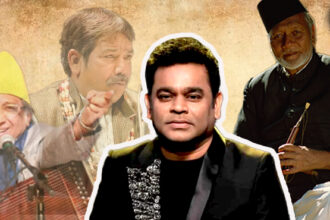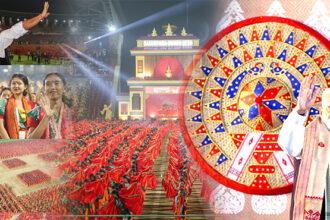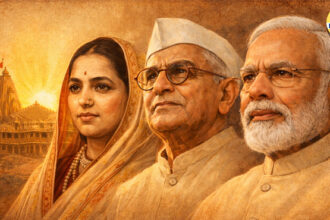The Rekha Gupta-led BJP government in Delhi has decided to take a significant step for establishing a Kashmiri Academy and museum in New Delhi for the preservation, representation and propagation of Kashmiri culture. The demand for establishing the academy and museum has come from the Kashmiri Pandit community led by a delegation of All India Kashmiri Samaj (AIKS). Its head Ravinder Pandita met cabinet minister in Delhi government Kapil Mishra in Delhi this week. The demand for setting up an academy “on the pattern of Urdu, Sindhi, Punjabi academy in Delhi-NCR to be managed by AIKS with the state government”, has been accepted by the Delhi government, reports say.
Thirty five years after Pakistan-sponsored terrorism and violence against Kashmiri Pandits compelled thousands of people of the community to leave their homes, efforts are on to secure a dedicated-physical space for housing remnants of memory, heritage, life and culture. An academy dedicated to Kashmiri literature, scripture, elements and archives of Shaivite literature, philosophy and thought, will be of unfathomable value to members of the community, their younger generations, and members of other communities.
According to Ravinder Pandita, this is the first time in 35 years that members of the community have reached out to the Delhi administration with the demand. Why was the demand not made during the previous
governments — over the decades? Pandita told this writer, “Our ordinary demands were not being met by the previous governments. How, then, could we have gone to them with a demand for preserving our culture and heritage through an academy and a museum? The time seemed right because the government in Delhi and Centre are governments that work for the Sanatan cause.”
In the absence of spaces dedicated to its art and heritgae in the national capital for three decades, members of the community have preserved their own culture and heritage through individual and collective efforts. With contribution of the government and support of lawmakers in the Delhi government, the process of preservation is expected to find the required cooperation, patronage, succour, resources and contribution.
“The library at the academy will house books of value on literature, philosophy, Kashmiri Pandit heritage and the arts. There are artefacts, depictions of traditional importance, scriptures and objects of art that the Kashmiri Pandit community has been preserving through its own efforts. There will be a memorial commemorating the memory of those Kashmiri Pandits who did not survive the acts of terror and violence on the community that led to our exile from Kashmir.”
A museum housing artefacts, scriptures and objects of Kashmiri Pandit heritage including sacred scriptures will be set up. The idea behind setting up the museum is to provide an interactive display of components of centuries-old Kashmiri Pandit heritage. Decisions on the location of the academy and museum will be taken after meetings between representatives of the community and the government.
The preservation of Sharda lipi (script), developing and spreading awareness of its heritage, is one of the prime concerns of members of the community demanding the academy. The finer aspects of Kashmiri life including the arts, traditional narratives, festivals, cultural fabric, clothing, ornamentation, festivals and rituals will find a platform through the academy and museum. The Delhi government has expressed its acceptance of the idea and demand of organising a two day Sharada Mahotsav in New Delhi. The festival, as planned, will be expanded to other cities. Ravinder Pandita has requested cabinet ministers in the Delhi government Mishra S Manjinder Singh Sirsa to visit the Sharda Temple at LoC Teetwal in Kashmir.
The Kashmiri Pandit Samaj led by Pandita will become part of commemoration of the 350th martyrdom anniversary of Sri Guru Tegh Bahadur Sahib in New Delhi. The development is in continuation of the
efforts being made by the Kashmiri Pandit samaj in their honour and gratitude for the sacrifice of Sri Guru Tegh Bahadur Sahib. “In September, a Gurduara Sahib commemorating the sacrifice of Sri Guru Teg Bahadur Sahib was reopened in the border village Teetwal, Kashmir.” It was constructed by the Save Sharda Committee Kashmir after renovation work of the Sharda Temple earlier led by them. The Kashmiri Pandit samaj has been consistent in paying reverence to Sri Guru Teg Bahadur — “the saviour of kashmiri pandits during Aurangzeb rule.”
While Pandita led the Sharda Divas celebration on LoC Teetwal Kashmir in symbolic yatra — from the Sharda Temple to the Whiteline Bridge in September, he is determined to make the Sharda Festival in New Delhi a convergence point for not just the Kashmiri Pandit community but also for Sanatan-unity. “Meetings will be held soon to decide the dates for the Sharda Festival. Government officials will be involved. We are excited, as this is the first time that any festival dedicated to the community’s history, art and heritage is coming up in the national capital.”
For decades, New Delhi has been a host and hub for academies and festivals dedicated to not only other displaced Hindu communities, but communities representing religious and cultural diversities from across the globe. Sadly, the Kashmiri Pandits had no academy or museum dedicated to their culture, lost culture, memory and retelling, over the decades. If all goes well, this Hindu community at the core of the Shaivite tradition in Bharat will have its first organised representation at centres of literature, culture and display.
Ideally, Kashmiri Pandits should have been in their own homes in Kashmir — the abodes they left in the land of their birth and their forefathers. Ideally, there should have been a museum of commemoration built right in the heart of Srinagar in Kashmir. Ideally, homes of Kashmiri Pandits across Kashmir, should have housed memory — thriving or scarred. Ideally, we Sanatanis should be attending a Sharada festival in Teetwal or Srinagar. Ideally, previous governments should have themselves volunteered or proposed a need for an academy and museum for Kashmiri history preserved by the Kashmiri Pandits.
However, now that the Kashmiri Pandits and Sanatanis have the moment to build the retelling through history, art and heritage, it needs to be celebrated in action, contribution and collaboration, with help from the Delhi government. We must support it, engage with it, and celebrate the hope for an emotional and cultural breakthrough.
— This story will be updated with comments from the Delhi government.









